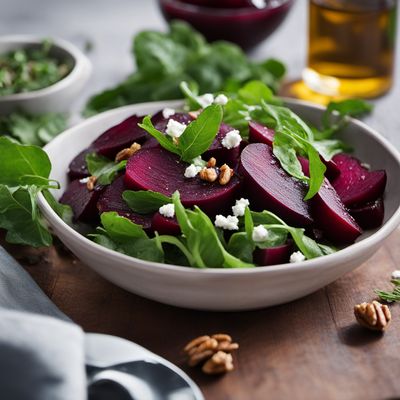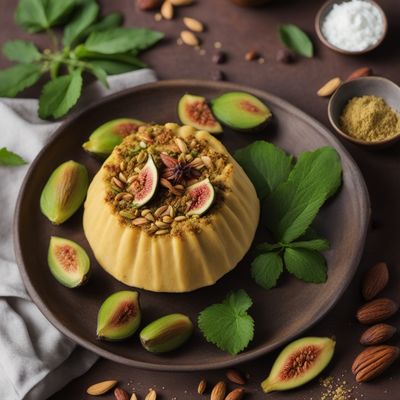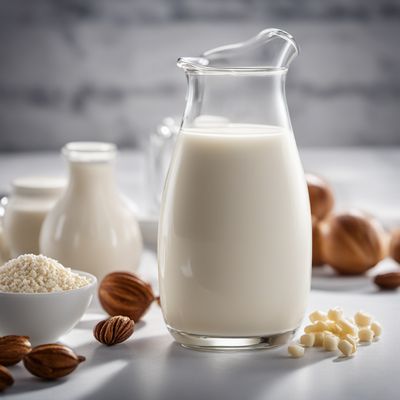
Ingredient
Goat milk
The Creamy Elixir: Unveiling the Delights of Goat Milk
Goat milk is a creamy and slightly tangy liquid that is produced by goats. It has a rich and smooth texture, similar to cow's milk but with a distinct taste. The color of goat milk can vary from pure white to a creamy off-white. It is known for its high nutritional value and is often used as a substitute for cow's milk in various culinary applications.
Origins and history
Goat milk has a long history dating back thousands of years. It is believed to have originated in the Middle East and Mediterranean regions, where goats were domesticated for their milk. Goat milk has been an important part of the diet in many cultures, including ancient Egypt, Greece, and Rome. It was highly valued for its nourishing properties and was often consumed by people who were lactose intolerant or had difficulty digesting cow's milk.
Nutritional information
Goat milk is a rich source of essential nutrients, including protein, calcium, phosphorus, vitamins A and D, and potassium. It is lower in lactose compared to cow's milk, making it easier to digest for individuals with lactose intolerance. A cup of goat milk contains approximately 168 calories.
Allergens
Goat milk is known to be a common allergen for some individuals, particularly those who are allergic to cow's milk. It is important to be cautious if you have a known allergy to dairy products.
How to select
When selecting goat milk, look for a fresh and unspoiled product. Choose milk that is free from any off-putting odors or flavors. Opt for organic or pasture-raised goat milk whenever possible to ensure the highest quality and nutritional value.
Storage recommendations
Goat milk should be stored in a refrigerator at a temperature of 40°F (4°C) or below. It is best to keep it in a tightly sealed container to prevent any absorption of odors from other foods. Consume the milk within 5-7 days of opening for optimal freshness.
How to produce
While producing goat milk on a larger scale requires specialized knowledge and equipment, it is possible for amateurs to raise goats and produce their own milk. However, it is essential to research and understand the proper care, feeding, and milking techniques to ensure the health and well-being of the goats and the quality of the milk.
Preparation tips
Goat milk can be used in various culinary preparations, including drinking it as a standalone beverage, using it as a base for smoothies, or incorporating it into recipes for baked goods, sauces, and desserts. It can also be used to make cheese, yogurt, or ice cream. When using goat milk in recipes, keep in mind that its distinct flavor may require adjustments to achieve the desired taste.
Substitutions
Cow's milk can be used as a substitute for goat milk in most recipes. However, keep in mind that the flavor and texture may differ slightly.
Culinary uses
Goat milk is commonly used in the production of various dairy products such as cheese, yogurt, and ice cream. It is also enjoyed as a standalone beverage or used in cooking and baking to add a unique flavor and creamy texture to dishes.
Availability
Goat milk is commonly available in many regions around the world, including Europe, North America, and parts of Asia. It is often found in specialty grocery stores, health food stores, and farmers markets.
More ingredients from this category
Recipes using Goat milk » Browse all

Quebec-inspired Dakos Salad
Maple-infused Dakos Delight

Grenadian Spice-infused Devils on Horseback
Spicy Grenadian Delights: Devils on Horseback with a Caribbean Twist

Roasted Sweet Beet Salad
Beet Delight: A Roasted Sweet Beet Salad

Pomeranian Olive Delight
Savor the Flavors of Pomeranian Olive Delight

Saraiki-style Fig Cheese
Savor the Sweetness: Saraiki-style Fig Cheese Delight

Dulce de Leche with a Middle Eastern Twist
Arabian Delight: Middle Eastern Dulce de Leche

Dulce de Leche - Spanish Style
Caramel Heaven: Spanish Dulce de Leche

Dulce de Leche Peruvian Style
Peruvian Caramel Bliss: Dulce de Leche with a Twist

Spanish Stuffed Figs
Delightful Figgy Surprise

Dulce de Leche Bosnian Style
Bosnian Sweet Delight: Dulce de Leche with a Twist

Monégasque Sailor Sandwich
Mediterranean Delight: Monégasque Sailor Sandwich

Dulce de Leche
Creamy Caramel Delight: A Latin American Twist on Argentinian Dulce de Leche

